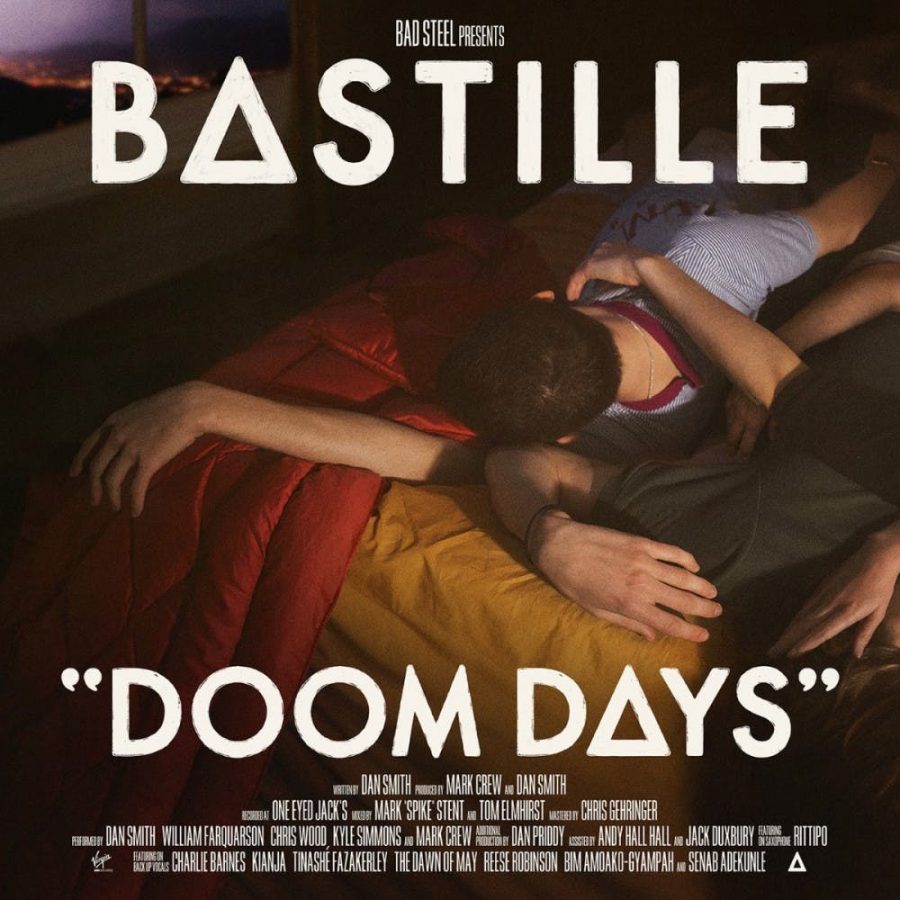Analyzing Bastille’s New Album
Sep 4, 2019
It can feel like the apocalypse is upon us when all that is talked about are the threats of climate change, chaos created by destructive politicians and fighting a battle with our internal conflicts.
As a soundtrack to accompany the chaos, British alternative rock band Bastille published their third album “Doom Days” with a theme.
The project is an audio experience in which life is expressed through the eyes of four fictional characters. “Doom Days” is Bastille’s most experimental album yet, having a wide range of sounds compressed into 11 tracks without too much compromise reflects the lead singer Dan Smith and the band’s signature creativity when it comes to songwriting.
Their second album “Wild World” was about confronting reality while “Doom Days” is the opposite, fixing their minds on being ignorant and naïve just to have a good time. The album is intentionally short and fast running, as if time is warped when partying through the night.
Over the course of one night, Bastille captures the emotions felt while the characters attempt to escape the horrors and drama of the outside world though partying, but everything soon backfires.
The album starts with the fast-paced song “Quarter Past Midnight” detailing level headed people returning home for the night while an ambitious group of friends remain on a mission to chase adventure. They want to lose control of their senses but search for some stability while they’re still sober enough to do so.
But why stop with making “Bad Decisions” (the second track) when the night is still young? The night is juxtaposed to Brexit and a difficult relationship.
Highlighted in the song are the lyrics “feeling lower than the Sterling” which represents the confusion with holding onto something harmful for the sake of invulnerability when they know the consequences are negative.
Perspective changes to a prudent partygoer who notices that others caught themselves in “The Waves” of their escapist mindset and wonders what
will happen to them.
The moods of partygoers begin to polarize in “Divide”. Two characters face friction when one tries to leave the party but the other wants them to stay. A ballad that alludes to the detached relationship between citizens perpetuated by their opinions on current politics.
With a techno electronic dance beat, speed picks up with the track “Million Pieces.
Although the main purpose of the night is to “just drink, f*ck, dance right through disaster,” someone is snagged into talking about politics. Stating that “the king’s a clown” and “don’t look outside, the world is ending,” is wanting to deny all the facts and leave those problems for the morning when the time comes and instead shed themselves of all troubles and let loose while they are still alive.
The noise made discussing politics is louder than the music itself and breaks an unspoken rule of the party.
In the title track, the character is “livestreaming the final day of Rome” during the middle of the party and has a sudden realization of the actual disaster playing out as they speak. The track “Doom Days” is the last song written for the album and has 30 verses that shine a reflection of today’s society and the way people react to chaos around them.
Selective hearing is the character’s coping mechanism to what they are seeing and ultimately decides to free himself from the phone’s negative effects by putting it down.
The repetitive sounding track, “Nocturnal Creatures” describes the feeling of liberation and the having the ability to be hedonistic.
At the lowest point in the night, “4AM” is being in a state of grogginess and contentment of being surrounded by the intoxicated people that they love.
In a song about a casual encounter, “Another Place” relates to when opposites finally unite. However, breaking promises and deceptiveness diminishes what a better life they could have if they were in a different situation.
The night is running out of time. “Those Nights” is someone begging to feel normal again with a human connection and understanding that they won’t be alive forever has caught up to them. Days are numbered and with doomsday upon them they must act fast.
However, before they can, the clock strikes 5 a.m. and they fall asleep.
In “Joy,” it is 8:34 in the morning, asleep on the kitchen floor a call comes in from a friend to set their minds straight. All the drama and anxiety of the night that came rushing in is washed away by a small piece of human interaction and injects a dose of euphoria. In an ironic twist, the phone that they were trying to escape all night comes in to save everything.




Sara • Sep 6, 2019 at 7:43 am
How beautifully and eloquently written. Bastille manages to make haunting yet meaningful and relevant music.